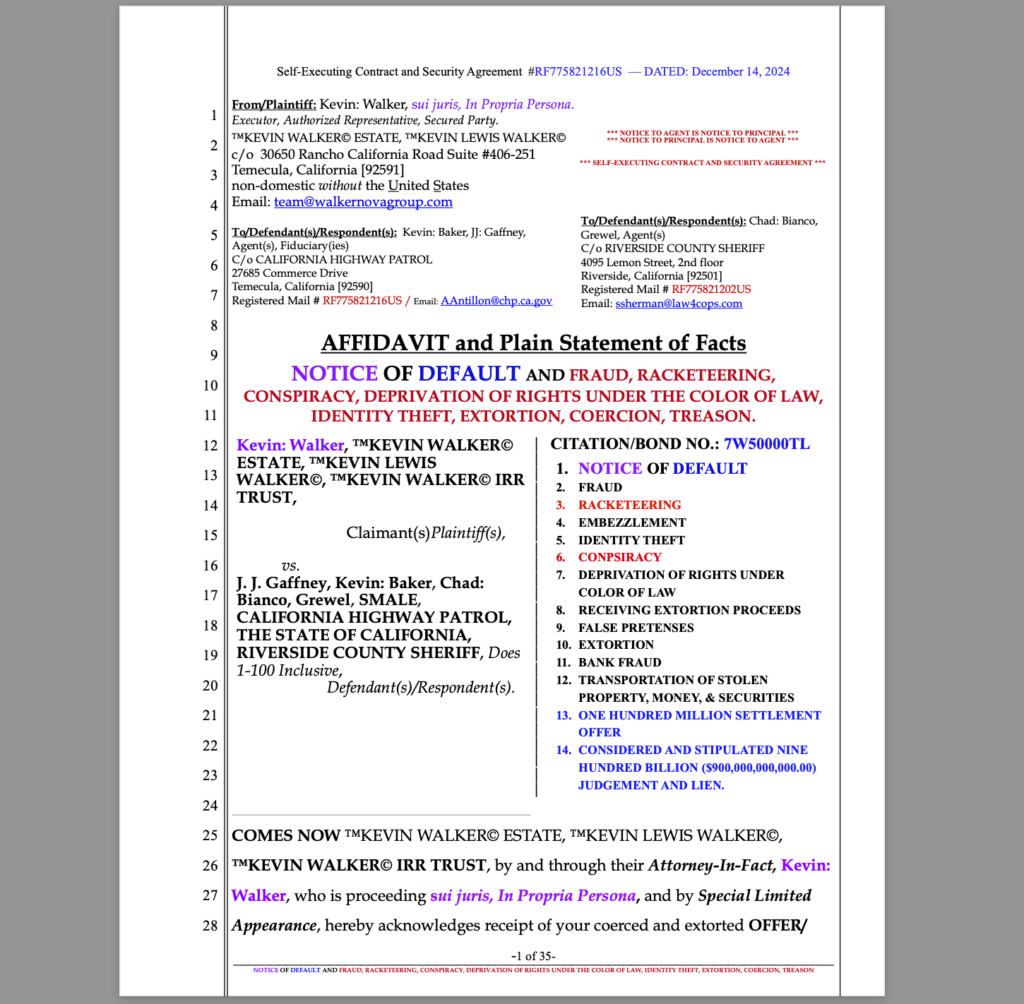What Is a Resident? A Thing, Not a Man or Woman
A critical distinction exists in “legal” terminology: a “resident” is not a living, breathing man or woman.
Instead, a “resident” is a thing—a “legal” construct created to identify something within a jurisdiction.
Black’s Law Dictionary defines a “resident” as a “person” who lives in a specific location, but under deeper scrutiny, this “person” refers to an ens legis—an artificial entity, such as a corporation, trust, estate, or other legal fiction. This is not opinion, this is indisputable fact.
A man or woman does not naturally become a “resident” unless they choose to identify as one through their actions, such as submitting to systems tied to ZIP Codes™ or other federally governed tools. Identifying as a “resident” means you are being treated as a thing within the federal system, governed by statutory codes, not as a sovereign man or woman with inalienable rights.
This distinction is crucial because when ZIP Codes™ are used, they imply jurisdiction over a thing and not a man or woman, further linking the individual to federal systems of governance and commerce.
Origins of the ZIP Code™
The ZIP Code™ system was introduced by the USPS on July 1, 1963, as part of a broader initiative to streamline mail sorting and delivery. The acronym “ZIP” stands for “Zone Improvement Plan,” emphasizing its purpose of improving efficiency by designating geographic areas with unique numeric codes.
In 1971, the USPS applied for and obtained a trademark for the term “ZIP Code,” safeguarding its use for postal purposes. This protection was a key step in ensuring that the USPS retained proprietary rights over the system. The trademark ensures that the ZIP Code™ system is not just a tool of public convenience but a proprietary, federally controlled mechanism.
The Legal Implications of ZIP Codes™
ZIP Codes as Trademarks
The term “ZIP Code™” is a trademark owned by the USPS, giving it proprietary control over the system’s application and usage. This designation prevents unauthorized use and ties the ZIP Code directly to the USPS’s operations, much like a private corporation protecting its intellectual property.
However, the trademark status also creates a legal framework that extends beyond mere intellectual property. By using a ZIP Code, individuals engage with a federally controlled system, opening the door to broader legal and jurisdictional implications.
How ZIP Codes Establish Jurisdiction
The use of a ZIP Code is not just a matter of convenience—it is a legal act with jurisdictional consequences. Here’s how:
1. Federal Jurisdiction Through ZIP Codes
The United States is divided into geographic zones using ZIP Codes, which are managed and regulated by the federal government through the USPS. When you use a ZIP Code on any document, correspondence, or contract, you are effectively acknowledging the federal system that governs these zones.
This acknowledgment places you under federal jurisdiction, particularly in matters of commerce, taxation, and legal disputes. The use of a ZIP Code signifies that the location in question is part of the federal zone structure, as opposed to a sovereign or private domain outside federal oversight.
2. Commerce and Interstate Regulation
ZIP Codes are integral to interstate commerce, which falls under federal authority via the Commerce Clause of the U.S. Constitution (Article I, Section 8, Clause 3). By using a ZIP Code, you signal participation in this federally governed commercial system.
For example:
- When a business ships goods across state lines, the ZIP Code is used to facilitate delivery under federal postal regulations.
- When a financial institution processes a transaction, the ZIP Code is often required to verify the address, linking the activity to federally regulated banking systems.
Thus, ZIP Codes are not just logistical tools—they are markers of participation in federally controlled commerce.
3. Contracts, Implied Agreements, and the Status of “Resident”
Using a ZIP Code on official documents often constitutes an implied contract with the federal government. This is not simply a theory but a fact demonstrated by the legal framework surrounding ZIP Codes. By voluntarily including a ZIP Code, you are consenting to the jurisdiction and rules governing the federal postal system and related commercial regulations.
Moreover, the designation of “resident” ties directly to the use of ZIP Codes. A “resident,” as defined in legal terms, is a “thing” identified within a specific jurisdiction, not a living man or woman. By using a ZIP Code, you are identifying yourself as a “resident” within a federal zone. This status shifts you from the standing of a sovereign individual to that of a corporate entity under federal oversight
The Connection Between ZIP Codes and the Status of “Residents”
The connection between ZIP Codes and federal jurisdiction becomes even clearer when examining the term “resident.” A “resident,” as legally defined, is a thing—a non-living legal entity subject to the jurisdiction of the state or federal government. When you use a ZIP Code, you are voluntarily identifying yourself as a “resident” within the federal system, thus tying your legal status to the corporate structure of the government.
A man or woman using a ZIP Code implies their consent to being treated as a “thing” or legal entity, such as a “resident,” under the jurisdiction of federal statutory law.
Clear Legal Overlap: Federal Jurisdiction Through ZIP Codes
The legal overlap between ZIP Codes and federal jurisdiction becomes evident when examining cases of taxation, licensing, and legal proceedings:
- Taxation: The IRS relies on ZIP Codes to identify the location of taxpayers. Using a ZIP Code can place individuals under federal tax jurisdiction by tying them to a federally recognized address within the United States.
- Licensing and Permits: Many federal and state licenses, permits, and applications require ZIP Codes to verify the geographic area of operation. This information subjects the applicant to regulations governing that zone.
- Legal Proceedings: Courts often rely on ZIP Codes to establish jurisdiction. When a ZIP Code is used, it signifies that the case or dispute falls within the legal authority of the federal or state government.
In each of these cases, the use of a ZIP Code acts as a voluntary acknowledgment of federal authority, whether explicit or implicit.
Opting Out of ZIP Code Usage
Some individuals who wish to avoid federal jurisdiction deliberately modify how they present ZIP Codes. One commonly used method is placing the ZIP Code in brackets, such as “[00000],” or writing “Near [ZIP Code].”
Why Does Bracketing Work?
- Breaking the Presumption of Participation
Bracketing a ZIP Code can signal that you are not willingly submitting to the federal jurisdiction implied by its use. It suggests that the ZIP Code is provided for reference purposes only, not as a declaration of federal citizenship or participation in federal systems. This method aligns with the Four Corners Rule, which asserts that contracts and agreements are determined by the explicit language contained within them—no extraneous or implied terms should override the clear intentions. By bracketing the ZIP Code, you are effectively marking the document as free from the presumption of federal participation. - Preserving Sovereignty
Using a ZIP Code without modification ties your address to federal systems, which may indicate your agreement to federal oversight. By bracketing the ZIP Code, you preserve your sovereignty as a private man or woman, distancing yourself from any implied contract with the federal government or status change. The Four Corners Rule helps ensure that only what is expressly stated in the document holds weight—bracketing the ZIP Code makes clear that no hidden or assumed obligations exist. - Avoiding Commercial Assumptions
By marking the ZIP Code as optional or referencing it indirectly, you emphasize that you are not engaging in federally regulated commerce or activities tied to federal jurisdiction. This tactic, consistent with the Four Corners Rule, ensures that the document reflects no implicit agreement to participate in such commercial systems, keeping your actions outside the reach of federal jurisdiction unless clearly stated.
Zip Code Usage NOT required: As evidenced by DMM 122.32 Under USPS Guidelines
According to DMM 122.32 under the USPS guidelines, ZIP Codes are not required for non-domestic (international) mail. This section of the Domestic Mail Manual indicates that for international mail, the postal address does not need to include a ZIP Code. — **Researching what a “state” or “nation” or “foreign government” or similar is, which results in mail being “international” is important.**
Here’s a breakdown of this provision:
- Non-Domestic Mail (DMM 122.32): When sending mail internationally, the ZIP Code is not necessary because the postal system of the receiving country is responsible for handling the delivery process and does not require the U.S. ZIP Code.
- International Addressing: While ZIP Codes are crucial for domestic mail within the U.S., international addresses typically rely on the postal system of the destination country. The USPS may still request the country code, but the ZIP Code is not a standard requirement for international addresses.
Conclusion
The ZIP Code is far more than a convenient tool for organizing mail—it is a trademarked system that carries significant legal and jurisdictional implications. By using a ZIP Code, individuals engage with a federally managed and commercially significant system, potentially placing themselves under federal jurisdiction as a “resident” or “thing” rather than a man or woman with inherent rights.
For those seeking to understand or limit their interactions with federal systems, the use of a ZIP Code should be carefully considered. Whether it’s through taxation, commerce, or legal proceedings, the ZIP Code serves as a gateway to federal authority—one that is far more powerful than its five-digit simplicity suggests.





